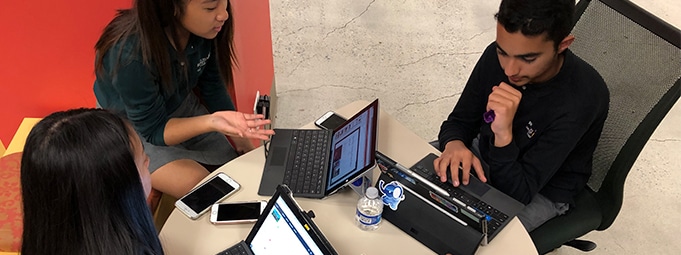
Students today have access to so much more information at their fingertips than ever before. And what’s even more alarming is how fast this information can change in a digital world. Technology is a normal part of society and its purpose and use continue to grow at an exponential rate. In order to accurately prepare our students for success, we need to understand the importance of digital citizenship and digital literacy in education.
Digital citizenship is about teaching students how to responsibly act and engage on the internet and with digital devices. The internet is so vast and complex it is almost like a world of its own with its own rules. With just a click of a button, students can reveal their location to the public or have their personal data exposed. That’s why it’s so important that we guide students on how to properly use their devices and safely navigate the internet.
It’s important that students understand privacy laws and how to stay safe online. This includes managing their passwords, photographs, and personal information.
The information shared online can easily be used to identify an individual. That means that we have to teach students how to protect details like their address, email, and phone number. In addition to educating students on how to turn off their location or geotag feature, we also explain how private details like license plates or street signs can be revealed in photographs.
Everything we post or share online is permanent and reveals the persona of the user. This digital footprint or tattoo is very difficult to erase and can follow users for years. Students need to know the importance of their tone of voice, phrasing, and content shared. Not just for themselves but its impact on others like cyberbullying.
Having easy access to so much information and content, it’s important that students understand copyrights and proper accreditation. Do they know how to properly cite source material and how to generate a license for their own work? This type of information will not only protect them but prepare them for their future academic needs.
Part of protecting their data is protecting their devices from viruses, malware, phishing, ransomware, and identity theft. As technology evolves more devices and platforms are being introduced and incorporated into education. Despite this, however, many institutions and individuals are neglecting the importance of cybersecurity. Since students are utilizing devices more it’s important that they know how to safeguard against viruses and malware.
Digital literacy is the ability to locate, analyze, and create content on various digital platforms. This doesn’t just mean knowing how to get around the internet. Digital literacy is more about an individual’s ability to discern quality sources and evaluate the credibility of online content.
It involves critical thinking and reinforces habits that keep children safe. It will also encourage them to ask clarifying questions from a young age and examine the content, no matter the source. These are skills they can carry with them.
It is more important than ever that students understand digital citizenship and digital literacy and how important they are to a healthy digital life.
Here at Renton Prep, we are always looking at how we can improve our students’ rate of success. We believe that adding digital citizenship and digital literacy in education is just the way to do that! Our award-winning approach to education is crafted diligently to prepare our students for the future.
To learn more about our teaching methods or if you have questions about enrollment, please contact us.